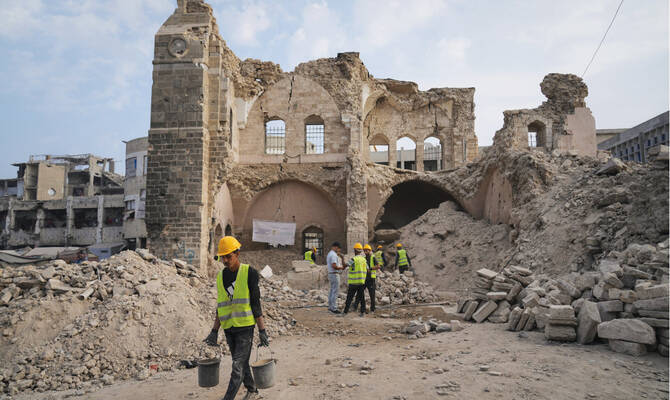ALGIERS: Algeria’s 75-year-old President Abdelmadjid Tebboune is self isolating because some officials in “upper ranks of the government” are sick with COVID-19, he said in a Tweet on Saturday.
Tebboune took office in December in an election that came amidst months of mass protests which forced his predecessor Abdelaziz Bouteflika from power after 20 years.
“I assure you, my brothers and sisters, that I am well and healthy and that I continue my work,” he said, saying his decision was taken on the advice of medical staff.
The global pandemic struck Algeria’s economy as it faced long-term challenges posed by the decline of the oil and gas revenues that finance its historically lavish state spending.
So far, Algeria has officially confirmed more than 55,000 cases of the coronavirus with nearly 2,000 deaths.
Though the pandemic forced an end to the weekly mass protest marches through Algiers and other cities that lasted for more than a year, the political challenges remain.
Tebboune has pushed for changes to Algeria’s referendum to limit presidential terms while expanding the powers of the parliament and judiciary.
However, many people in the leaderless protest movement believe their core goals of replacing the old ruling elite and forcing the army to stay out of politics remain unmet.
Algerians will vote in a referendum on the new constitution on Nov. 1, with Tebboune and the country’s powerful army generals seeking a high turnout in order to turn a page on the protests.
Algerian president, 75, self isolates as pandemic spreads
https://arab.news/wsyt7
Algerian president, 75, self isolates as pandemic spreads

- Tebboune is self isolating because some officials in “upper ranks of the government” are sick with COVID-19
- “I assure you, my brothers and sisters, that I am well and healthy and that I continue my work,” he said
Fledgling radio station aims to be ‘voice of the people’ in Gaza

- The electricity crisis is one of the most serious and difficult problems in the Gaza Strip, says Shereen Khalifa Broadcaster
DEIR EL-BALAH: From a small studio in the central city of Deir El-Balah, Sylvia Hassan’s voice echoes across the Gaza Strip, broadcast on one of the Palestinian territory’s first radio stations to hit the airwaves after two years of war.
Hassan, a radio host on fledgling station “Here Gaza,” delivers her broadcast from a well-lit room, as members of the technical team check levels and mix backing tracks on a sound deck. “This radio station was a dream we worked to achieve for many long months and sometimes without sleep,” Hassan said.
“It was a challenge for us, and a story of resilience.”
Hassan said the station would focus on social issues and the humanitarian situation in Gaza, which remains grave in the territory despite a US-brokered ceasefire between Israel and Hamas since October.
“The radio station’s goal is to be the voice of the people in the Gaza Strip and to express their problems and suffering, especially after the war,” said Shereen Khalifa, part of the broadcasting team.
“There are many issues that people need to voice.” Most of Gaza’s population of more than 2 million people were displaced at least once during the gruelling war.
Many still live in tents with little or no sanitation.
The war also decimated Gaza’s telecommunications and electricity infrastructure, compounding the challenges in reviving the territory’s local media landscape. “The electricity problem is one of the most serious and difficult problems in the Gaza Strip,” said Khalifa.
“We have solar power, but sometimes it doesn’t work well, so we have to rely on an external generator,” she added.
The station’s launch is funded by the EU and overseen by Filastiniyat, an organization that supports Palestinian women journalists, and the media center at the An-Najah National University in Nablus, in the occupied West Bank.
The station plans to broadcast for two hours per day from Gaza and for longer from Nablus. It is available on FM and online.
Khalifa said that stable internet access had been one of the biggest obstacles in setting up the station, but that it was now broadcasting uninterrupted audio.
The Gaza Strip, a tiny territory surrounded by Israel, Egypt, and the Mediterranean Sea, has been under Israeli blockade even before the attack on Oct. 7, 2023, which sparked the war. Despite the ceasefire, Israel continues to strictly control the entry of all goods and people to the territory.
“Under the siege, it is natural that modern equipment necessary for radio broadcasting cannot enter, so we have made the most of what is available,” she said.














